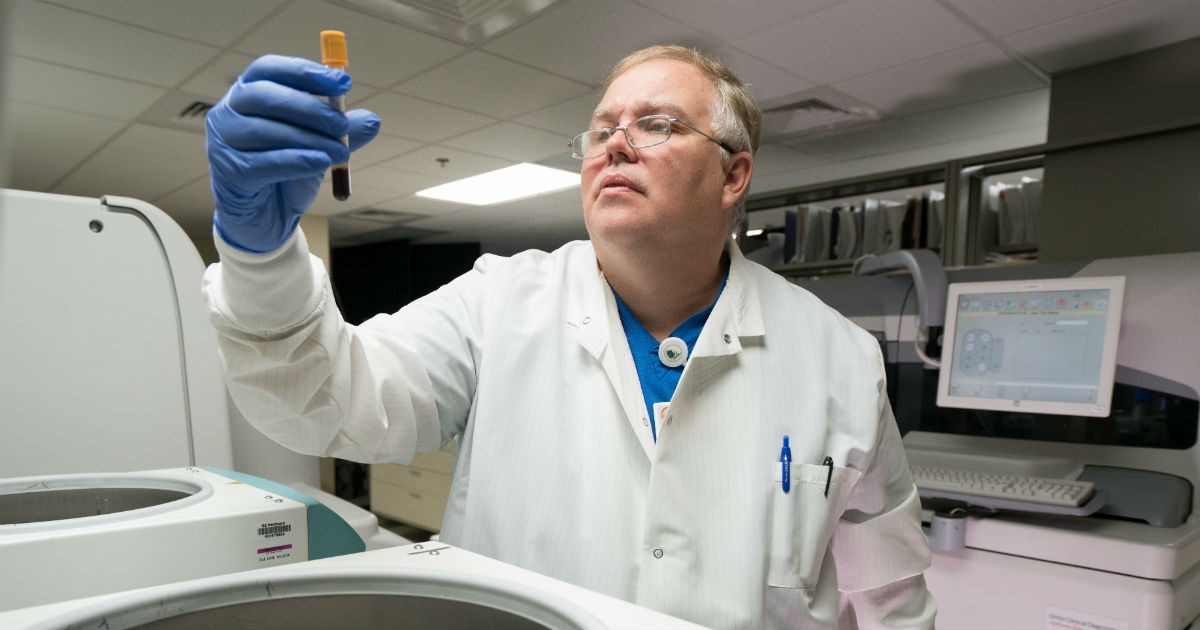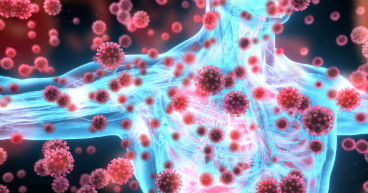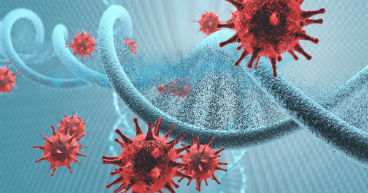
Cancer and viruses have had a long and complicated relationship that goes back decades. For cancer patients, viruses like the flu often are an unwelcome intruder that worsens some cancer symptoms or treatment side effects. Some viruses can even cause cancer. But several viruses have also aided cancer research and have been used to treat some cancers.
Now, a new virus has arrived on the scene with specific and consequential implications for cancer patients—so far, none of it positive. What we do know is that cancer patients are more susceptible to COVID-19, and those with blood cancers and underlying chronic lung disease who develop lung cancer may experience more severe symptoms from the virus. Weaknesses in the immune system and impaired lung function are likely at the heart of these increased risks, experts believe.
But so much is still unknown about COVID-19, making it impossible to predict its ultimate impact on the still-evolving interplay between viruses and cancer. Will patients whose respiratory system is damaged by the virus have an increased cancer risk? How long are patients immune from the virus after recovering from it? Will we learn something about the virus that may lead to new cancer treatments? “This is a brand-new virus, and carcinogenesis takes years to evolve and study,” says Shayma Master Kazmi, MD, Medical Oncologist at our hospital in Philadelphia. “We will be monitoring for long-term effects of COVID-19.”
Understanding COVID-19’s long-term impact on cancer and cancer patients will require researchers to consider the known interactions between cancer and viruses in general. Here’s a brief history:
Viruses that cause cancer
Researchers first linked viruses with cancer in the early 1900s, when scientists discovered that a virus in a tumor found in a chicken could be transmitted to other chickens. The discovery launched a field of research called tumor virology, or oncovirology, that eventually led to the discovery of oncoviruses—viruses that can cause cancer—in humans. Currently, there are seven known oncoviruses. Among the most common are:
Human papillomavirus (HPV) is linked to almost all cases of cervical cancer and large percentages of many other cancers in men and women, including those of the throat, anus, penis and vagina.
Hepatitis B virus (HBV) is a leading cause of liver cancer.
Hepatitis C virus (HCV) can lead to liver cancer and non-Hodgkin lymphoma.
Human immunodeficiency virus (HIV) significantly increases cancer risk because it damages the immune system. People with HIV have higher risks of developing lymphomas and other cancers.
Epstein-Barr virus (EBV) increases the risk of lymphomas and stomach cancer.
When a virus attacks the body, it invades specific cells and may alter the DNA in those cells to allow the virus to survive and reproduce. Changes or mutations in cellular DNA have the potential to turn normal healthy cells into cancer cells. Viruses may also cause inflammation, a known risk factor for some cancers.
But most viruses do not lead to cancer, and most cancers are not caused by viruses. There’s also no evidence that getting infected by common viruses that give you cold or flu-like symptoms will increase your risk of cancer, “unless that tendency is revealed to be related to a defect in the immune system,” says Maurie Markman, MD, President of Medicine & Science at Cancer Treatment Centers of America® (CTCA). “Most colds are simply due to exposure to common viruses that are not a cause of cancer.” Research indicates that around 15 percent of all cancers may be linked to viruses.
Current cancer vaccines
Scientists develop preventative vaccines by using weakened or harmless forms of viruses to give the immune system the information it needs to recognize and attack potential threats. Therapeutic vaccines are used to compel the immune system to attack cancer cells. Here are four vaccines designed to treat or prevent cancer:
- Sipuleucel-T: This was the first therapeutic cancer vaccine to receive U.S. Food and Drug Administration (FDA) approval. Used to treat some forms of prostate cancer, sipileucel-T uses a patient’s re-engineered cells that are injected back into the body to help activate the immune system.
- Bacille Calmette-Guerin (BCG): A preventive vaccine for tuberculosis, BCG is also used as a therapeutic vaccine to treat very early stages of bladder cancer. The drug is delivered directly to the bladder tumor to attract immune cells to that location.
- Hepatitis B vaccine (HBV): In 1981, HBV became the first FDA-approved vaccine to prevent cancer. The U.S. Centers for Disease Control and Prevention recommends that children receive the vaccine shortly after birth to prevent liver cancer.
- Human papillomavirus (HPV) vaccine: These preventive vaccines are designed to protect against infections from HPV strains responsible for many cancers.
Vaccines have not yet been developed to treat or prevent HIV, HCV, EBV or other cancer-related viruses.
Using viruses to treat cancer
Around the turn of the 19th century, doctors and researchers observed that cancers regressed in some patients who developed viral infections. Since then, scientists have been seeking ways to turn the tables on some viruses and use them to either treat or prevent cancer. To date, however, only one so-called oncolytic virus therapy—talimogene laherparepvec—has been approved by the FDA to treat some forms of melanoma. Made from a weakened, or attenuated, herpes virus, the drug attacks cancer cells inside melanoma tumors and attracts immune cells to that location.
Still, research continues into virus therapy for cancer, using weakened versions of viruses that can cause serious illnesses, including measles and polio. One such high-profile clinical trial at Duke University is exploring whether an attenuated polio virus can treat glioblastoma, a devastating form of brain cancer with a very low five-year survival rate. In the trial, featured in a 60 Minutes report, several patients had the weakened virus injected directly into their brain tumors. Early results from initial treatments were encouraging enough to prompt the FDA to give the research so-called breakthrough status, meaning evidence indicates “the treatment may offer substantial improvement over available standard therapy.” While all the patients in the 60 Minutes segment eventually died from their disease, several lived long beyond the average 15-month life expectancy after their diagnoses. One patient, who was 20 when she was treated at Duke, passed away in March, eight years after her initial treatment.
At the MD Anderson Cancer Center, doctors are studying whether a weakened adenovirus—responsible for many common colds—can be used to treat brain cancer. Adenoviruses are relatively safe, reducing the potential for serious side effects.
Although research into viruses to treat cancer has so far produced only one approved drug in the United States, many clinical trials continue to study how oncolytic virus therapy may be used alone and in combination with other treatments against multiple cancers.
“The idea that attenuated viruses may be employed as a strategy to treat malignant disease continues to be examined Dr. Markman says. “While development efforts and success in this arena have been limited, with greater understanding of the fundamental biology of cancer as well as advances in the technology, it is possible such approaches will find an important role as a component of future cancer care.”
What’s the difference?
Some terms and phrases used to describe cancer-related viruses and treatments may sound the same, but they have different meanings. For instance:
Oncovirus or oncogenic virus can cause cancer.
Oncolytic virus may be used to treat cancer.
Viral oncolysis occurs when a cancer cell exposed to an oncolytic virus breaks down and dies.
Oncovirology is the study of viruses to treat cancer.
If you’re a cancer survivor or in active treatment and are concerned about how the COVID-19 situation may impact you or your care, please contact your care team.



